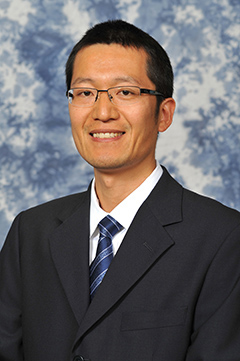Master of Science in Cyber Security
Our master’s degree program in cyber security provides an experiential learning-rich curriculum tailored to your interests and industry’s needs. The program offers personalized capstone options for research and professional tracks with a large number of elective courses. Flexible course scheduling within our programs allows you to start taking classes during either fall or spring semester.
Our research capstone options (thesis or project) engage you in cyber security research projects under the guidance of a faculty research mentor. Research capstones help you develop skills to investigate cyber security issues, discover new cyber security knowledge and present your research to professionals in industry or academia. After completing a research capstone, you’ll be prepared to continue your research and development in cyber security areas or work in industry, practicing your professional skills.
Our professional capstone option will train you with the latest technological trends in cyber security through a combination of core and elective courses. The capstone course, Experiential Learning in Cyber Security, prepares you to address real-world cyber-attacks and design defense strategies through The University of Toledo’s Cyber Range. Guided by UToledo IT security professionals, the capstone course will help you develop the competencies you need to work as a cyber security professional in a rapidly evolving IT world.
Meet Sai Naini
Class of 2021, Master of Science in Cyber Security
“I'm glad to say that UToledo now has a master’s program dedicated to Cyber Security. In my experience, I believe this program will have a great impact for students planning a career in security. Dr. Sun has been a good guide in encouraging me to take up projects and tasks which will help me improve in my career going forward.”
Meet Omar Sabri
Class of 2022, Master of Cyber Security
“When I first joined this program I wanted to learn everything about cybersecurity. During my first year I have learned about network security, hardware security as well as fundamentals of cybersecurity. That inspired me to keep learning more about cybersecurity so I then completed 3 certifications - CND, EHCS, and CEH. This program really helped me to obtain those certifications. I am glad that I have joined this program.”
Meet Asheq Siddiquee Tanmoy
Class of 2022, Master of Science in Cyber Security, President of UToledo Cyber Security Club
"Cyber Security is an integral part of a stable world to help shape the future and the constantly evolving present. The research track of this program has availed me a Department of Energy funded research opportunity on the security aspect of distributed critical energy asset. To advocate a safer cyberspace, I am also engaged in activities beyond the academic perimeter through the University of Toledo Club for Cyber Security (UToledoCCS)."
Program Requirements
The MS in Cyber Security program requires 30 cr hr of coursework and/or research in cyber security and related areas. The detailed curriculum for the Master of Science in Cyber Security program is in the University of Toledo Graduate Catalog.
Course descriptions can be viewed in the catalog by clicking on the course number. Most courses are currently offered on campus, but some online offerings are available for additional flexibility.
ENGINEERING CORE (10 Cr. Hr.)
Three required core courses cover the security of the computer system, the network system and the broader cyberspace.
Engineering electives (8-14 Cr. Hr.)
Elective courses from engineering are selected to develop depth in cyber security areas. One of these electives can be taken in a related area to support the specific cyber security research or topic of interest.
Non-Engineering ELECTIVES (3 Cr. Hr.)
The non-engineering elective course options from business or law provide broader societal perspectives to provide breadth in cyber security areas.
Capstone option (3-9 Cr. Hr.)
Thesis, project or experiential learning in cyber security course, depending on the selected capstone option.
Admissions Requirements
To be considered for admission, you must have a bachelor’s degree in computer science or a closely related field.
If you are a graduate from another STEM discipline, foundational courses in computer programming, data structures, computer networks, and operating systems are required to be considered for admission. The University of Toledo courses that satisfy these requirements are listed below:
- Programming (CSET 1200 or EECS 1510)
- Data Structures and Algorithms (CSET 3150 or EECS 2510)
- Computer Networks (CSET 4750 or EECS 3150)
- Operating Systems (CSET 4350 or EECS 3540)
If you are missing one or more of the above courses, you will need to take those courses before being considered for admission to the program. Comparable courses at other universities can be found in Transferology. If you have questions, please contact the Program Director.
Application Process
Admissions are made on an individual basis and take into account the applicant’s previous educational record and professional experience. Applications are accepted at any time. There is no application deadline.
- Completed and signed online Online Application Form
- Transcripts from each institution attended showing degree obtained (exception: UT graduates)
- A personal statement written in response to a cyber security prompt
- GRE exam scores for applicants who select a research capstone option and whose degree is from a non-US institution
- Three letters of recommendation, with at least one from a professor or employer
- English language proficiency documentation for applicants whose native language is not English and who received their undergraduate degree from a non-English speaking institution
- U.S. citizens or U.S. permanent cardholders: $45 non-refundable application fee
- International students: $75 non-refundable application fee
Tuition and fees
Tuition and fees for this program are available on the Treasurer's Office website. Cost for the degree depends on enrolled credit hours each semester. Graduate tuition has plateau pricing between 12-15 cr hr.
Questions?
For more information, please contact the Program Director.

Weiqing Sun, Ph.D.
Professor, Engineering Technology Department


